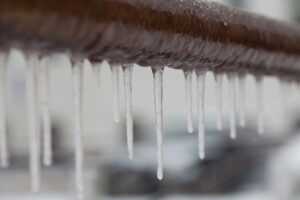
We’re glad you’re asking this question, because it means you know that ice shouldn’t form on your AC. People often make the mistake of thinking ice is a natural outcome of how an air conditioner works. But it’s not.
If ice starts to form along parts of an air conditioner, it signals a malfunction that has thrown off the way the system absorbs heat from the air inside the house. There are several potential causes for ice appearing on an AC, and we’re going to examine the most common of them. In most cases, it will take AC repair in Benton, AR to correct the problem.
The Source of Coil Freeze in an AC
The evaporator coil is the place where you’ll see ice forming if there’s a malfunction with the AC. This coil is the spot where the air conditioner pulls heat from the air to lower its temperature. The AC does this by drawing warm air across the coil, causing the cold refrigerant inside it to evaporate and pull heat from the air. The refrigerant warms up and the air cools down.
If something prevents the coil from absorbing enough heat, the refrigerant will remain at a temperature below freezing. This will then cause moisture along the coil to freeze into ice. Now a vicious cycle starts, because the ice along the coil will further restrict the absorption of heat, causing more ice to form. This will continue until the coil is fully frozen and the AC can no longer provide cooling at all.
Why the Coil Isn’t Absorbing Enough Heat
We’ve explained the basics of how the evaporator coil can freeze, but we haven’t addressed the different causes of the coil losing the ability to absorb heat and trigger ice formation. This is the heart of the issue, and there are several possibilities:
- Clogged air filter: Leaving the air filter for an HVAC system in place for too long so it becomes clogged creates a host of problems, including coil freeze. As the clogged filter throttles off airflow, less warm air passes over the coil and the refrigerant absorbs less heat.
- Leaking refrigerant: An iced-over coil is a major warning sign that an AC is losing refrigerant to leaks. It sounds odd that less refrigerant would create ice, but the trouble is that the reduced refrigerant amount lowers heat absorption. The remaining refrigerant in the coil is too cold and leads to ice formation.
- Dirt and grime on the coil: If the inside of an AC becomes dusty and dirty (which can happen if the system isn’t regularly maintained), it may cover the coil and make it harder for the coil to absorb heat. This can also happen because of the development of mold and mildew on the coil.
Call Us for the AC Help You Need
If you see ice on your AC’s evaporator coil, please don’t try to scrape it off. This may end up damaging the coil and it won’t solve the core problem. It’s better to shut the system down and then call for professionals. You can trust us to find what’s wrong and fix it.
Dewees HVAC is here to keep you comfortable. Call us for air conditioning service in the Conway Area.













